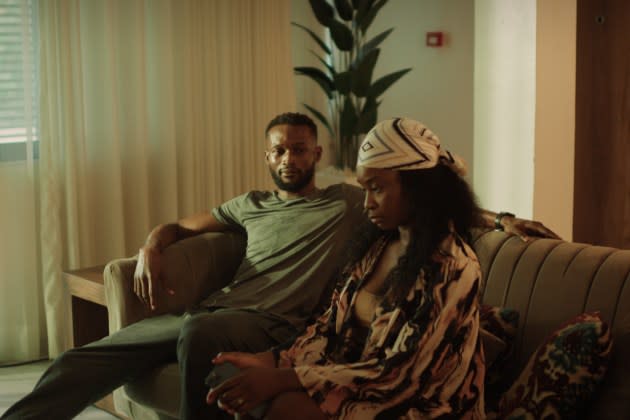Genre-Bending Nigerian Thriller ‘The Weekend’ Drops First-Look Clip Ahead of Tribeca Premiere (EXCLUSIVE)

The family that slays together stays together in Nigerian director Daniel Oriahi’s “The Weekend,” a bloody thriller about a woman who discovers a shocking secret about her soon-to-be in-laws. Variety has been given exclusive access to a clip from the movie ahead of its world premiere in the Midnight section of the Tribeca Festival, which runs through June 16.
Produced by Uche Okocha of Trino Motion Pictures and executive produced by Babatunwa Aderinokun, “The Weekend” marks the fourth theatrical release from Oriahi and was written by Egbewamei Sammy, Vanessa Kanu and Freddie O. Anyaegbunam, Jr. New York-based The Film Sales Company is repping world sales. Here’s an exclusive first look:
More from Variety
Tribeca-Bound Sci-Fi Horror 'She Loved Blossoms More' Unveils Teaser (EXCLUSIVE)
Tribeca Festival 2024 Reveals Creators Market Participants (EXCLUSIVE)
Speaking to Variety from Lagos, Oriahi dished on the evolution of Nigeria’s ragtag Nollywood industry, his crash course in the “Roger Corman film school” and the long journey from Lagos to the starry heights of New York’s premier film fest.
“It’s still very surreal, this whole experience,” he says. “One year you are making low-budget movies, then…the next year, you’re getting called that your film has been selected for Tribeca. It’s like, ‘Okay, this is happening!’”
Though he’s logged more than a decade in Nigeria’s prolific Nollywood film industry, Oriahi hasn’t followed quite the same career path as most of his peers. To be fair, he’s churned out his share of straight-to-streaming melodramas — nearly 30 in the past six years alone — but his filmography reflects riskier creative gambits, such as his 2013 debut, “Misfit,” a psychological thriller, and the supernatural thriller “Sylvia.” His breakout, the action comedy “Taxi Driver: Oko Ashewo,” premiered at the Toronto Film Festival in 2015 and went on to become Nigeria’s third-highest grossing film that year.
“The Weekend” is by far his most ambitious production to date; by Oriahi’s estimates, its price tag dwarfed those 30 low-budget flicks combined. But even a filmmaker with lofty ambitions is subject to the practical realities of making movies in Nollywood, famed for its mad dash from script to screen. When Oriahi was attached to “The Weekend,” after a previous director pulled out, he had less than a month of prep time until the cameras rolled. The film was shot in under three weeks.
“Nollywood challenges you,” he says. “Nigeria is great, Nollywood is a thriving environment, but it can be very exhausting. It’s just a churning machine.”
“The Weekend” starts off on familiar ground with the story of a woman, Nikiya, played by Uzoamaka Aniunoh, looking for acceptance from her prospective in-laws. Despite his initial reluctance to introduce her to the family, her fiancé, Luc (Bucci Franklin), finally agrees. The two set off for the family’s rural homestead, where after a warm welcome, things soon take an unexpected and grisly turn.
Oriahi says he wanted to explore the messy inner workings of relationships: how and why partners hold back, and how their secrets — though rarely quite as macabre as in “The Weekend” — often lead to destructive results. “I wanted to tell stories about the intricacies of relationships, family dynamics, trauma,” he says, “the dysfunction that can happen sometimes in a family dynamic, and how that affects people psychologically.”
The director cites influences ranging from Kubrick’s “The Shining” and Polanski’s Apartment Trilogy to contemporary filmmakers playing with “subversive horror,” including Ari Aster, Robert Eggers and Jordan Peele. He’s also drawn homegrown inspiration from the nascent genre scene in Nigeria, where filmmakers like Michael Omonua (“Juju Stories”), Abba Makama (“The Lost Okoroshi”) and C.J. Obasi (“Mami Wata”) — together known as the Surreal 16 collective — have blazed a trail with their genre-infused movies, scooping prizes at Sundance and Locarno and bowing at other A-list fests.
Their success, says Oriahi, reflects an inflection point for the Nigerian industry. While Nollywood filmmakers having long taken strides to create movies with higher production values and more international appeal than their predecessors, only recently have directors dared to venture beyond the mainstream. That’s finally begun to change.
“I feel it’s a long road,” Oriahi says. “But at the same time, there’s a strong desire from upcoming filmmakers to do different stuff, to see films that are pushing the envelope and exploring other genres.” Nigerian audiences, too, have now spent the better part of a decade delving into the vast catalogs of Netflix and other global streaming platforms, and in the process “becoming very articulate in the language of film, with more exposure to a wide array of films.”
Oriahi is also casting a wide net as a filmmaker: His next project, “A Ghetto Love Story,” which has already wrapped production, is billed as a real-life story about love and resilience that was co-written and produced by Basketmouth, perhaps the most famous comic in Africa. Details about the plot and release date are being kept under wraps, but after cutting his teeth in the B-movie trenches, Oriahi is ready for wherever his next step will take him.
“Nigeria can be a trip,” he says. “I want to make films that Nigerians can watch and that internationally can get recognition. I’m hoping with this kind of breakthrough [at Tribeca], more opportunities can come [for me] outside of Nigeria.”
Best of Variety
Sign up for Variety’s Newsletter. For the latest news, follow us on Facebook, Twitter, and Instagram.

